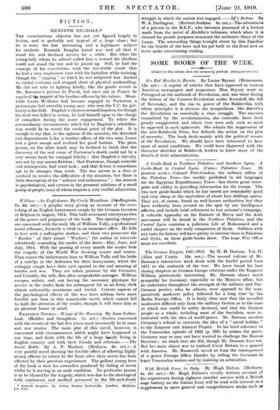KENNETH DUG DALE.* Tax conscientious objector has not yet figured
largely in fiction, and is probably not typical of a large class ; but he is none the less interesting and a legitimate subject for analysis. Kenneth Douglas hated war and all that it stood for, and declined service for a while. But when the young lady whom he adored called him a coward his idealism could not stand the test and he joined up. Still, he had the courage of his convictions, with the inevitable result that be had a very unpleasant time with his battalion while training, though the " ragging " to which he was subjected was limited to verbal criticism and stopped short of physical mishandling. He (lid not take to fighting kindly, like the gentle recruit in Mr. Bateman's picture in Punch, but once out in France he regained the respect of his brother-officers by his valour. Mean- while Laura McAlister had become engaged to Fortescue, a picturesque but unstable young man who won the V.C. for gal- lantry in the field. Dugdale's chances seemed hopeless, for though his rival was killed in action, he laid himself open to the charge of cowardice during the same engagement. To relate the extraordinary circumstances which led to Dugdale's rehabilita- tion would be to reveal the cardinal point of the plot. It is enough to say that, in the opinion of the narrator, the detached and dispassionate Lake, a brother-officer of the two men, Laura had a great escape and realized her good fortune. The plain person, on the other hand, may be inclined to think that the discovery of the real cause of Fortescue's death could not be a very secure basis for conjugal felicity ; that Dugdale's chivalry was not by any means flawless ; that Fortescue, though unstable and intemperate, had cruel luck ; and that fiction is sometimes apt to be stranger than truth. The war serves as a dens ex machind to resolve the difficulties of the situation, but there is little description of its " ardours and endurances " ; the interest is psychological, and centres in the personal relations of a small group of people, none of whom inspires a very cordial admiration.






































 Previous page
Previous page